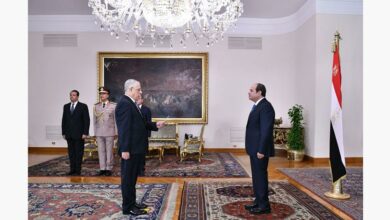Just a few hours after judges heard about President Mohamed Morsy’s decision to dismiss the public prosecutor, they were able to mobilize a robust opposition to the decree — and foment accusations that the newly elected Islamist leader is infringing on the independence of the judiciary and threatening the rule of law.
Pictures of Abdel Meguid Mahmoud vowing to remain in office and addressing hundreds of colleagues who rallied in his support made the front pages, bearing a flagrant embarrassment to the president and conveying a heroic image of a prosecutor who still carries the stigma of belonging to the former regime.
Morsy’s inability to get rid of Mahmoud despite his notoriety, coupled with Morsy’s earlier failure to reverse a court ruling that dissolved Parliament, raises the question of whether judges will remain a thorn in the side of Egypt’s new ruling Islamist elite, closing the avenue off to the consolidation of their power.
Mahmoud’s reinstatement last week is not the first goal the judiciary has scored against Morsy. Since the day he took office, Morsy has capitulated to judges’ decrees on at least three occasions.
He first refused to be sworn in before the Supreme Constitutional Court and insisted on taking the oath before Parliament. This was seen as defiance to the court, which had just dissolved the Islamist-dominated People’s Assembly.
When judges held that that oath would be invalid, Morsy changed his mind.
A few weeks later, Morsy had to renege on his decree to reinstate Parliament after the Supreme Constitutional Court ruled that his move was invalid and the Judges Club gave him 36 hours to apologize for violating a court verdict.
An ideological standoff?
Muslim Brotherhood leaders contend that the judiciary is a reactionary force that hands down politicized verdicts aimed at thwarting political change.
“Some of the judiciary’s politicized members believe they can have power over all other branches of government. We cannot build a democratic system without addressing that issue,” says Hatem Abdel Azim, a leader of the Brotherhood’s Freedom and Justice Party and former People’s Assembly member.
He says the involvement of some judicial members in politics and their endorsement or opposition to political projects “cannot continue.”
“It may not necessarily be the Islamist project or Morsy’s project, but [judges] oppose any radical change in the political process, and they seek to hinder the revolution and maintain things as they were under the former regime,” Abdel Azim says.
For Mohamed al-Gamal, a former State Council president, this discourse is part of a larger smear campaign against the judiciary. He holds that all verdicts that did not please the Brotherhood were inevitable.
“The judiciary cannot approve of despotic and dictatorial measures that violate the law and the constitution. This is why judges always seem in confrontation [with the Brothers],” says Gamal.
He says the Brothers seek to stretch their hegemony over the political, administrative and judicial systems, but “followed legally wrong ways to achieve their goals.”
Before Morsy’s ascent to power, the FJP incurred similar losses to the judiciary. In April, an administrative court declared the Islamist-dominated Constituent Assembly invalid, after it had been elected by Parliament to draft the constitution.
The ruling came in response to appeals contending that the assembly failed to represent all political and social groups. The FJP was forced to form a new assembly after ceding a few more seats to non-Islamists.
Meanwhile, Islamist lawmakers had to abandon a bill aimed at overhauling the SCC after judges voiced their vehement opposition to such propositions, accusing Islamists of seeking to change the judicial system to serve their ideological agenda.
The recurrent tension prompted some observers to note that the judiciary might act as the last defense line against the Islamization of the state.
“Most judges belong to the civil bloc, which envisages a rule based on constitutional legitimacy and not Islamic Sharia,” says Gamal.
However, Nathan Brown, political science professor at George Washington University and an expert on Egypt’s judiciary, says the current standoff between judges and Islamists does not have ideological roots, contending that the judiciary is far from a coherent ideological bloc.
“I do not think it breaks down as easily as secularists versus Islamists, though that is one important dimension,” Brown says. “There are some judges who see themselves as guardians of the Egyptian state and society against a partisan Islamist project. And there are some who are much more comfortable with the Islamist vision, especially in its Muslim Brotherhood version.”
He says there are divisions, such as those perceived as with the old regime and those who are not.
Akram Ismail, a youth leader with the left-wing Popular Front Alliance, contends that the judiciary is “a conservative sect” that uses its leverage to resist political change.
“It turned out that the judiciary is protecting certain networks of interests and the old regime more than the Supreme Council of the Armed Forces,” he argues.
In August, Morsy sacked SCAF leader Hussein Tantawi and Armed Forces Chief of Staff Sami Anan, and abrogated a constitutional charter that instated military guardianship over the elected president. Morsy’s soft coup had disappointed many secularists who bet on the generals to stand up to Islamist ambitions in post-Hosni Mubarak Egypt.
Ismail says judges are pursuing the political role they had played under Mubarak to protect certain social segments — namely, the bourgeoisie and top bureaucrats.
“Under Mubarak, the SCAF was not a direct player in ruling Egypt, but the judiciary has been. It has played historical roles to protect the interests of the strongest classes,” argues Ismail.
Under the former president, the judiciary became an active player in resolving debates on public policies. For example, in the 1990s, the SCC played a crucial role in legitimizing Mubarak’s neoliberal turn by ruling in favor of privatization. Meanwhile, it defied the regime’s authoritarian fist by issuing decrees stressing certain political rights.
Morsy’s dilemma
While many observers hold that the judiciary needs to undergo sweeping reforms, they rule out the possibility that Morsy and his group can achieve this goal.
Adel Ramadan, a lawyer with the Egyptian Initiative for Human Rights, says it is too late for the Brothers to take revolutionary measures vis-a-vis the judiciary.
“Any exceptional measure, such as sacking the public prosecutor or certain judges, should have been made before a new political system was established,” he says. “Now we have a legal legitimacy and a political system that is somehow stable. We have a president and a prime minister, so you can’t just put us back on the revolutionary track.”
Although the judicial code does not ensure judges’ full independence, it makes them immune against dismissal by the executive branch.
“I am against Abdel Meguid Mahmoud and believe he should leave. But if we let Morsy do it, we will give him free hand to sack thousands of judges later on,” Ramadan continues.
Since Mubarak’s ouster, revolutionaries have demanded the sacking of Mahmoud, who was appointed by Mubarak in 2006. They argued that he was deliberately ruining cases against stalwarts of the old regime.
But neither the generals nor Morsy heeded the demand until last week.
After a criminal court acquitted 24 defendants of killing protesters during the “Battle of the Camel,” a presidential adviser announced that Morsy had appointed Mahmoud as ambassador to the Vatican.
“The problem is that the Brothers have a dual discourse,” says Sherif Younis, a historian and a political columnist.
They sometimes use revolutionary discourse to justify moves such as Mahmoud’s dismissal, Younis says. But they deviated from the revolutionary path when they agreed to take over for the generals before sweeping reforms were introduced to Mubarak’s political and judicial system.
Hence, rebelling against Mubarak’s legal framework would always be taken in bad faith, he argues.
“Any attempt to introduce reforms will be seen as a step toward stretching the Brothers’ hegemony,” Younis says.
Murky future
The Brothers bet that after the new parliament is elected, they can confront the judiciary and reverse old laws that limit their ability to effect change.
“We are in an exceptional situation now because there is no parliament,” says Abdel Azim. “Soon we will have a parliament, and we will go back to the right equation whereby the judiciary abides by laws made by the parliament.”
For example, the new parliament can change the law prohibiting the dismissal of the public prosecutor, adds Abdel Azim.
However, the election of a new legislature could take longer than Abdel Azim expects.
Until the Constituent Assembly passes a new constitution and a public referendum approves it, no parliament can be elected — and the fate of the constitution’s architects hinges on a court ruling.
An administrative court has yet to rule over appeals challenging the legitimacy of the second Constituent Assembly. If dissolved, a new assembly should be formed by Morsy. Meanwhile, several judicial bodies, including the SCC, have voiced objection to the draft constitution recently issued by the assembly.
Such a looming development would renew the tension between the Brothers and judges and prolong political instability.
“I expect things to get worse and the conflict to continue,” says Ismail.




